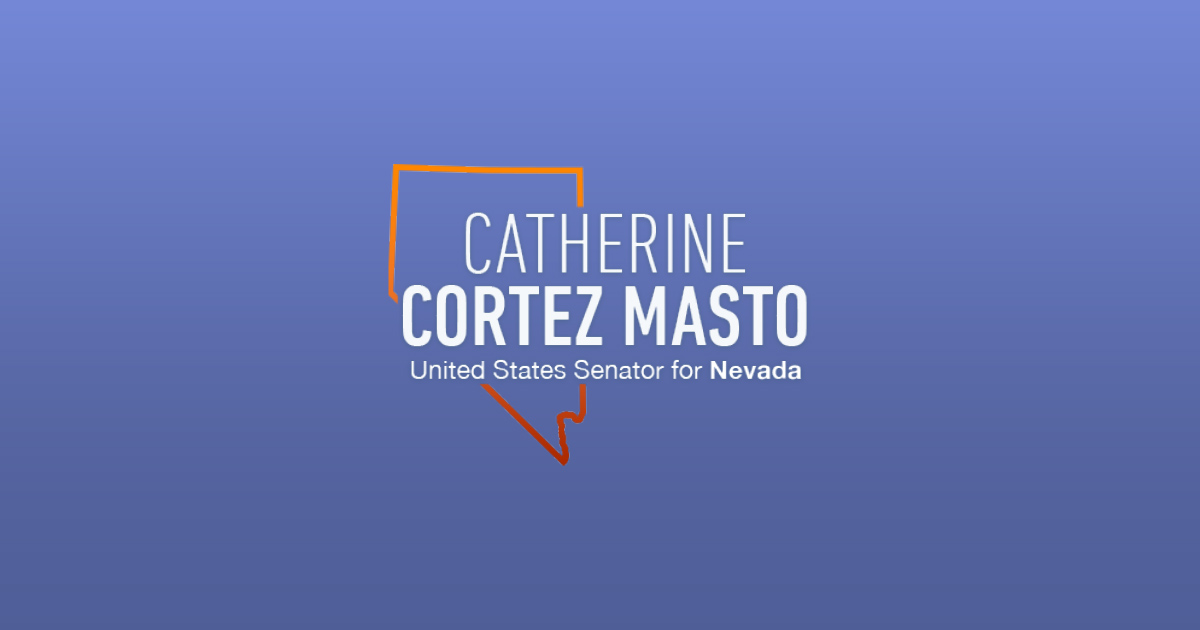Source: United States Senator for Nevada Cortez Masto
March 31, 2022
Washington, D.C. – U.S. Senators Catherine Cortez Masto (D-Nev.) and Joni Ernst (R-Iowa) and U.S. Representatives Bill Pascrell, Jr. (D-N.J.) and Don Bacon (R-Neb.) today introduced bipartisan, bicameral legislation to require the Department of Health and Human Services (HHS) to collect data on the connection between domestic violence and traumatic brain injuries. The Protecting Survivors from Traumatic Brain Injury Act of 2022 would help assess how prevalent these injuries are and inform service providers about resources and support for survivors.
In September 2018, Senators Cortez Masto and Ernst passed legislation requiring the GAO to report on federal efforts to study the prevalence of traumatic and other brain injuries among victims of domestic violence. The study found that more data is needed to understand the prevalence of brain injury in domestic violence victims, and recommended that the Department of Health and Human Services (HHS) develop a plan to improve data collection. The Protecting Survivors from Traumatic Brain Injury Act is the next step in the Senators’ efforts, and will help HHS implement that plan and suggest support options.
“Since my time as Nevada’s Attorney General, I’ve worked to reduce domestic violence and support survivors,” said Senator Cortez Masto. “Survivors can suffer brain injuries from being hit and choked, and it’s incredibly important that we understand more about this problem so we can address it and get survivors treatment. I’ll continue working in the Senate to make sure that people who have experienced intimate partner violence get what they need to heal.”
“Nearly one in three adults are survivors of domestic violence, an issue I’ve long worked to combat as a survivor myself,” said Senator Joni Ernst. “There’s more to be done to bolster research and data on these harmful injuries, including traumatic brain injuries, and this bipartisan bill will help us improve reporting and in turn find more effective ways to treat and support survivors.”
“It is a tragic fact that survivors of domestic violence can often suffer traumatic brain injury,” said Rep. Pascrell, the co-founder and co-chair of the House Traumatic Brain Injury Caucus. “But like traumatic brain injuries generally, this terrible problem is poorly understand and understudied. We need to know much more on TBI’s prevalence among domestic violence survivors so we can better tailor preventative measures and treatment. This legislation is important.”
“Traumatic brain injuries not only impact our men and women in uniform, but everyday Americans, including survivors of domestic abuse and sexual violence,” said Rep. Bacon, co-chair of the Congressional Brain Injury Task Force. “I have always supported increasing TBI research and treatment options for those with these types of injuries. This legislation is a great next step in getting the data and tools needed to address the issue and work to prevent these situations from happening in the first place.”
The Protecting Survivors from Traumatic Brain Injury Act directs HHS to collect data on the connection between brain injuries and domestic and sexual violence. HHS would be required to create and implement a data collection project under the umbrella of the National Intimate Partner and Sexual Violence Survey (NISVS) to better understand the prevalence of brain injuries related to domestic and sexual violence.
The Act is endorsed by Futures Without Violence; National Association of State Head Injury Administrators; National Coalition Against Domestic Violence; MANA: A National Latina Organization; Violence Intervention Program; Esperanza United; Legal Momentum, the Women’s Legal Defense and Education Fund; National Resource Center on Domestic Violence; Justice for Migrant Women; and Vera Institute of Justice.
Senator Cortez Masto has been an outspoken advocate for victims of domestic violence, sexual assault, and human trafficking. She cosponsored and helped secure passage of the reauthorization of the Violence Against Women Act, which will help law enforcement crack down on violent predators and improve access to resources for survivors. Her bipartisan Fairness for Rape Kit Backlog Survivors Act, which requires state programs to allow sexual assault victims to file for compensation without being unfairly penalized for delays due to rape kit backlogs, was included in the reauthorization. She also led the call for robust funding for the Byrne JAG grant program in the FY2022 omnibus to make sure that law enforcement has the resources it needs to hold perpetrators accountable.
###
